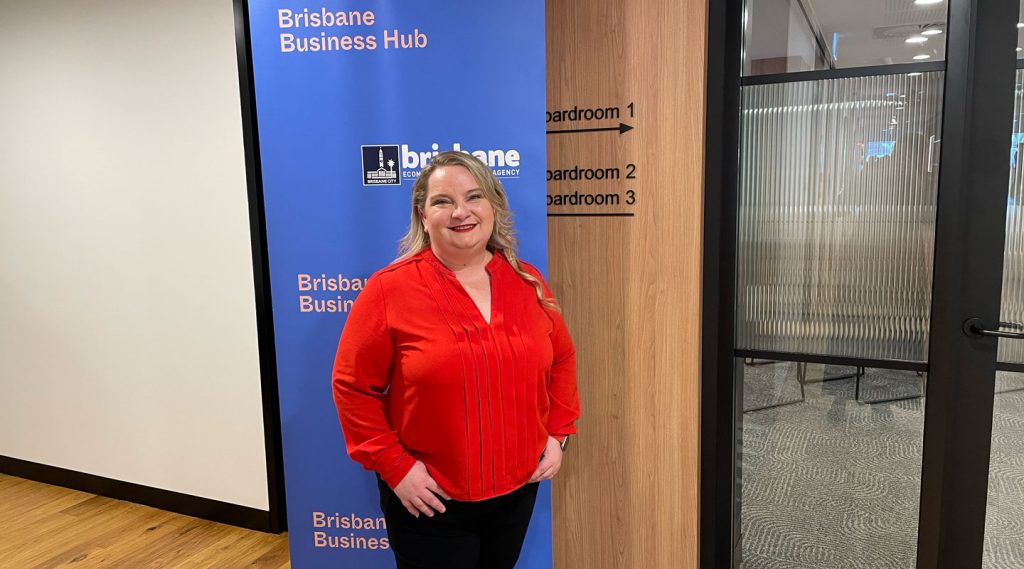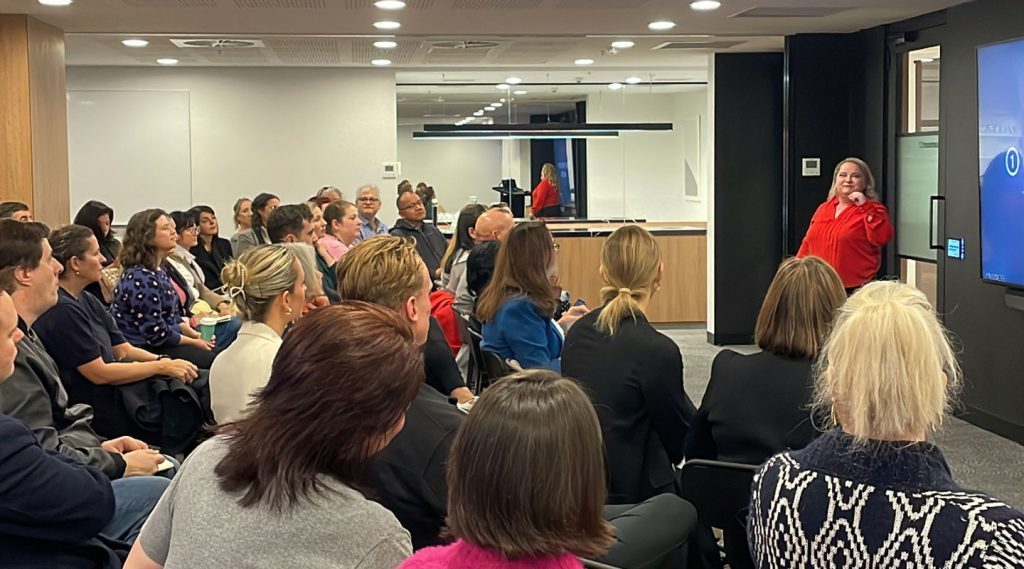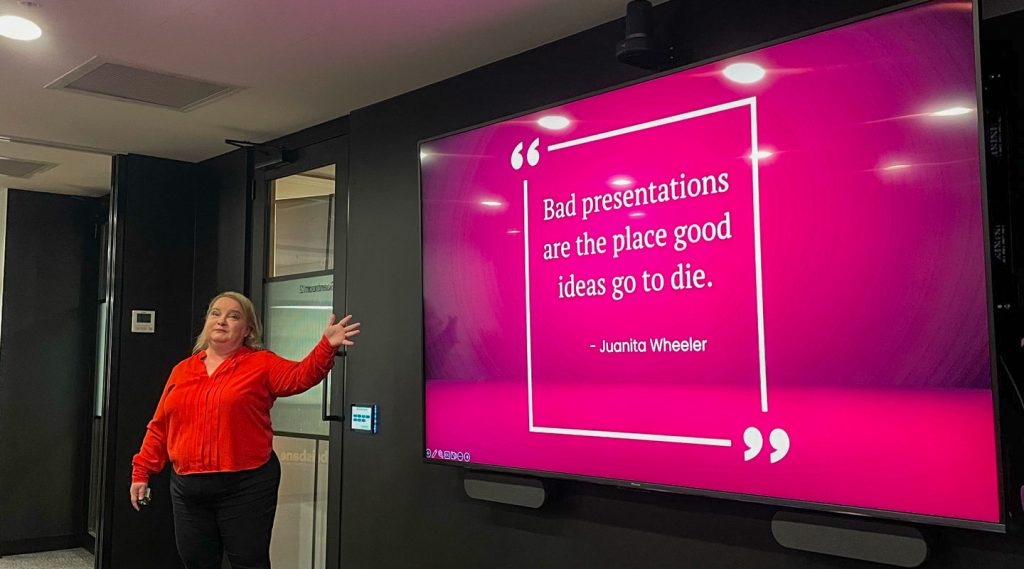“You don’t have to be great to start, but you do have to start to be great.” – Zig Ziglar
Public speaking is a powerful tool that can elevate your brand, connect you with new audiences, and turn them into loyal customers by fostering trust and inspiration. But building up the confidence to talk to a room full of people about your business can be a challenge, even for those born with the gift of gab.
Recently, we had the pleasure of hosting Juanita Wheeler at the Brisbane Business Hub. As a public speaking and pitching coach, speechwriter, and CEO of TEDxBrisbane, Juanita has coached over 100 TEDx speakers in bringing their ideas to the stage. Here’s what we learned from Juanita about making your voice heard.
Great presenters are made, not born
Juanita started by debunking one of the biggest misconceptions about public speaking – the idea that great presenters are born with a natural aptitude for the spotlight.
“Public speaking often has a mystique around it, as if you come into the world knowing what to do,” she said. “But the reality is, it’s just like any other skill. You learn, you apply, you practice.
“There is absolutely nothing about being a great public speaker that you cannot learn to do well.”
Yes, that means introverts can become outstanding public speakers, too.
“Being an introvert is actually an asset,” Juanita explained. “Introverts, fearful of embarrassing themselves, are often more prepared to put in the effort required to deliver great presentations. They are very attuned to everyone in the room because they worry about whether the audience is engaged and enjoying the presentation.”
Juanita pointed out that while extroversion may be beneficial for impromptu speeches and wedding toasts, it is not as effective for intentional, strategic presentations designed to influence an audience.
“The best idea doesn’t always win,” she said. “It’s often the person who presents their idea the most convincingly and passionately that wins.”
Strive for 80 per cent perfection

Even if you consider yourself a perfectionist, Juanita suggests embracing the 80/20 rule for public speaking.
“80 per cent perfection is as high as you should go, leaving room for 20 per cent mistakes, or ‘authentic human moments’,” she advises. “These are the moments where you forget a word, or you simply show your humanity. Embrace them. If you’re aiming for 100 per cent perfection, you’ve failed before you start.”
Juanita said she prepares TEDx speakers for exactly these types of moments.
“We always suggest having a ‘dead air’ joke or a human moment ready. For instance, we had a 21-year-old speaker who had never spoken publicly. She was nervous about losing her place, so we scripted a line for her: ‘This was so much easier when I rehearsed in the shower.’ When she used it, the audience laughed and cheered, and she relaxed.
“Give yourself permission to be genuine. That’s where the magic happens.”
The 7 step guide to becoming a successful public speaker
Want to harness the power of public speaking for business growth? Here are Juanita’s seven rapid-fire steps to transform your speaking engagements into impactful business opportunities.
1. Know your why
Before you speak, it’s crucial to understand why you’re speaking at a specific event, or on a specific topic.
“Every decision you make – where you speak, what you speak about, how much you charge or don’t charge – should be made strategically,” Juanita said. “Why do you want to speak? There’s no wrong answer because it’s personal and individual, and you should own it. When you know your why, write it down.”
Without a clear purpose, you might end up in front of the wrong audiences, or at the wrong events.
“Whether you’re advocating for social change, or aspiring to become a motivational speaker as your primary income source, you must know your purpose,” Juanita said. “Different speaking gigs may have different objectives, and that’s okay. What’s important is to be clear about your reasons for each engagement.”
Knowing your why influences all of your decisions, and helps you avoid rookie mistakes.
“Knowing exactly why you want to speak is the heart of doing this strategically and avoiding rookie errors,” Juanita said. “That’s where strategy begins.”
2. Make a speaking gig wish list

Once you know your why, you can determine your who.
Juanita said to think about your target audience and the top conferences they attend in your area. Not sure? Do some digging.
“Follow them on LinkedIn, see what events they’re hitting up, and then track down the decision-makers for those events,” she said. “Send a compelling application or a friendly cold email to get on their radar.”
Keep your speaking gig wish list fresh by reviewing it every six months, and enjoy crossing off the goals you achieve. Remember, new events are always popping up, so stay in the loop.
Juanita also reminded us that public speaking is all about the audience, not about you.
“It’s about delivering value to the people in the room. What do they need to hear? What’s going to make their time worthwhile?”
3. Perfect your idea in 12 words or less
The ‘12-word rule’ is one of the toughest challenges for TEDx speakers, especially when it involves concepts they’ve spent years, even decades, developing. But Juanita insists it’s essential.
“Conveying a complex concept to an audience in a brief amount of time – whether it’s one minute, five minutes, or an hour – requires strategic honing of your message,” she said.
“Imagine you’re all set to speak, you’ve got a strategic list of gigs, and you’re ready to present. But if your talk contains 20 ideas, it’s too much. Stick to one idea per presentation.”
As Einstein once said, ‘If you can’t explain it to a six-year-old, you don’t understand it yourself.’ This is especially true for topics involving tech, science, engineering, or any jargon-heavy fields.
Juanita provided a practical scenario: The key decision-maker you need to impress might not be in the room, but their colleague, assistant, or partner is. After your talk, they’ll summarise your presentation to the decision-maker.
“If you’ve done your job well, they’ll convey it in 12 words or less,” she said. “Anything more, and the essence gets lost. Your goal is to make your idea memorable and easy to relay, so it can become an advocate even when you’re not present.”
4. Make your case
So, you’ve nailed down your why, got your strategic wishlist, and honed your idea into 12 words or less – now it’s time to make the case for why you should be one to speak.
“Rookie errors often occur when people pitch,” Juanita said. “First, they sell their brilliant idea but forget to sell themselves. It’s shocking how often people find their topic on the event program, but with a different, more experienced speaker delivering it. That’s because they didn’t make the case for themselves.”
Here’s the simple formula: You + Your Unique Experience + Your Honed Idea = The Ideal Speaker for the Event.
“It’s not just about qualifications,” Juanita explained. “If you’re pitching to speak at a conference about parenting children with disabilities, then personal experience of parenting a child with disabilities can be more valuable than having multiple PhDs.”
When you pitch, tailor your application to the event. “Show them you understand their community and how your presentation will bring value,” Juanita advised.
She also suggests having a go-to bio at the ready, in various lengths. “Keep a 125-word bio handy. You can trim it to 100 words or expand it to 200 as needed.”
5. Choose your application content wisely

Generally, there are two types of application processes for events – open applications and invitation-only. While some events host open mic calls to select their speakers, most professional conferences are either invitation-only or have an application process.
When it comes to applying, make sure you follow the formula: why you’re qualified to speak to that audience, why you’re a good fit for them, and why your idea is relevant.
“If it’s a closed event with no open invitations, there’s no harm in sending an email to inquire about their curation process,” Juanita suggested. “Find out who curates the event and follow them on LinkedIn. Even if it’s a closed process, they might still be interested in your pitch.”
When you do email event organisers, it’s important to be strategic.
“Never blanket email everyone, especially for TEDx,” Juanita warned. “Curators talk, and generic applications that don’t consider the community will get you on the ‘no’ list.
Juanita emphasised the importance of following application instructions to the letter.
“If they ask for 150 words, don’t write 151. If they request a PNG headshot, don’t send a JPEG. Curators are busy, and they will discard applications that don’t follow the guidelines.”
She also stressed the importance of submitting applications on time – and presenting yourself confidently, but humbly.
“The industry is small, and reputations travel fast. Don’t be the speaker nobody wants to work with.”
6. Decide when – and how much – to charge
Determining when and how much to charge for your speaking engagements is crucial.
“There are lots of ways to be paid,” Juanita said. “You need to set what’s right for you based on the circumstances and your strategic objectives.”
For instance, if you’re speaking at an industry conference with 2,000 attendees who are your target audience, you might choose not to charge.
“You’re not selling from the stage, but you are showcasing how awesome your product is without directly saying ‘buy it’,” Juanita said. “This strategic decision can balance out financially through subsequent sales.
“Sometimes, instead of a strict fee, you can negotiate other forms of payment, like flights, accommodation, online promotion, or sponsorships. Get creative with your compensation.”
Juanita stressed the importance of a speaker kit, which should include a headshot and bios. While it typically shouldn’t list your fees, this can vary depending on your target audience.
“Know your worth; no one can tell you your worth but you,” she emphasised. “Always send an invoice, even if it’s a 100 per cent discount. This sets the expectation for you, the client, and the industry about your worth.”
7. Submit or send your applications
One of the biggest mistakes people make is hesitating to submit their applications, even if they’ve put in the work. Juanita’s final piece of advice might come as a shocking revelation, but believe it or not, “if you actually click send or submit, your chances of being booked for a speaking gig dramatically increase.
“You can’t call yourself a speaker until you’ve spoken, so strategically make that happen,” she said.
And if you’re worried about rejection?
“Even the most experienced speakers get a ‘no’ about 90 per cent of the time,” Juanita said. “Welcome to the club. There are always more applications to speak than there are spots.”
But if you actually click submit, you’ll have more chances of someone saying yes.
“The best way to get your next speaking gig is to be superb at your last one,” Juanita said. “That’s where people see you, find you, and recommend you for future events.
“Everyone can do it. You’re not born a great speaker; you learn to do it. So if you have a great idea, are passionate about it, and want to champion it, these steps are what you need to do.
“You don’t have to be perfect… just get started.”





























